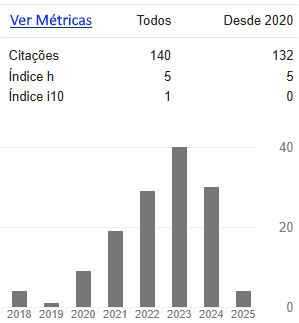ENVIRONMENTAL AND URBAN QUALITY IN SOCIAL HOUSING PRESIDENTE PRUDENTE – SP: THE CASE OF ANA JACINTA HOUSING ESTATE
Abstract
The right to suitable housing has become recognized and accepted by the international community since its inclusion in the Universal Declaration of Human Rights in 1948, whose text, in its article 25, alleges that everyone has the right to an adequate standard of living for the family’s health and welfare, including food, clothing, medical care and the necessary social services. In Brazil, low constructive and architectural quality mark the production of social housing, culminating on the reduction of the beneficiary’s quality of life and environmental problems. Therefore, the present work aims to submit surveys and analysis of Ana Jacinta housing complex in the city of Presidente Prudente, São Paulo, in order to evaluate the environmental and urban quality of the units delivered to beneficiaries in the early 1990s. The methodology is based in bibliographic and documentary surveys.

